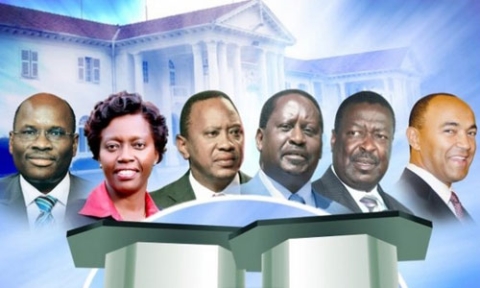
Knight Fellow Joseph Warungu moderated Kenya's first live political debates among presidential candidates. President-elect Uhuru Kenyatta (third from left) is facing charges of crimes against humanity at the International Criminal Court.
Kenya’s national election resulted in victory for Uhuru Kenyata, a man charged with crimes against humanity in the International Criminal Court. His top rival, Raila Odinga, has petitioned the Kenyan Supreme Court challenging the election. As the nation waits for the court’s ruling, Knight Fellow Joseph Warungu reflects on the election’s implications.
“Choices have consequences.”
That warning to Kenyans, issued almost a month before the election by U.S. Assistant Secretary of State Johnnie Carson, played on the minds of many voters as they cast their ballots on March 4.
During a briefing with journalists in early February, Mr. Carson was pushed to explain America’s position regarding the candidacy of two politicians who are charged with crimes against humanity at the International Criminal Court. He had a simple answer:
“We live in an interconnected world,” he said, “and people should be thoughtful about the impact that their choices have on their nation, on the region, on the economy, on the society and on the world in which they live. Choices have consequences.”
Alone in the polling booth, over 6 million Kenyans weighed the options and made their choice.
As a consequence they now have in Uhuru Kenyatta and William Ruto, a president-elect and his deputy, who will divide their time between running Kenya and fighting their cases at The Hague, where they are accused of fueling violence in Kenya’s previous presidential election.
Compared with the bloody events of 2007, the latest election could be viewed as a victory for Kenyan democracy.
With over 80 percent of registered voters heading to the polling stations, it was the highest turnout in Kenya’s history. And with the final results taking six days to be released, and not a machete lifted in anger, this was Kenyans at their most patient.
By turning up in such large numbers, Kenyans were re-establishing their faith in the democratic process.
And with Raila Odinga pledging to accept the verdict of the Supreme Court which will hear his petition against Kenyatta’s election, he and the rest of Kenya were expressing confidence in the institution of the judiciary.
So what awaits the new President if he prevails in the Supreme Court?
A divided nation.
The election results confirmed what every Kenyan has always known – that the country is still deeply split along ethnic lines.
Most people voted not for ‘policies that speak to me’ but for ‘personalities that speak like me.’ Deep and genuine social healing and building of bridges will be a top priority.
Kenya also is a nation where the land issue remains a touchy one, with major implications for the country’s development.
For a man whose family owns huge tracts of land in different parts of Kenya, Kenyatta will be under a lot of scrutiny to see how he tackles the issue of land ownership.
Kenyans will watch keenly how his government addresses historical injustices regarding land that have left thousands displaced and forced Kenyans periodically into conflict, disrupting lives and livelihoods.
The nation also will watch how Kenyatta and Ruto deliver on promises to be modern ‘digital’ leaders, compared to rivals who were said to be stuck in the old ‘analog’ era.
As a broadcaster, I understand digital to mean bigger capacity, greater variety and flexibility, and better quality – in this case of leadership and service delivery.
Kenyans are looking up to the new leadership with great hopes for better health care, more jobs, improved agriculture and a faster pace of economic development.
The people are waiting to learn the real consequences of their choice in this election and what will preoccupy the new president and his deputy – Kenya’s development or the ICC process.